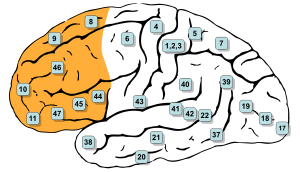Prefrontal
| Prefrontal Cortex | |
|---|---|

Brodmann areas 8, 9, 10, 11, 12, 13, 14, 24, 25, 32, 44, 45, 46, and 47 are all in the prefrontal cortex.
|
|
| Details | |
| Part of | Prefrontal lobe |
| Components |
Superior frontal gyrus Middle frontal gyrus Inferior frontal gyrus |
| Artery |
Anterior cerebral Middle cerebral |
| Vein | Superior sagittal sinus |
| Identifiers | |
| Latin | Cortex praefrontalis |
| MeSH | A08.186.211.730.885.213.270.700 |
| NeuroNames | ancil-101 |
| NeuroLex ID | Prefrontal cortex |
| FMA | 224850 |
|
Anatomical terms of neuroanatomy
[]
|
|
In mammalian brain anatomy, the prefrontal cortex (PFC) is the cerebral cortex which covers the front part of the frontal lobe. The PFC contains Brodmann areas 8, 9, 10, 11, 12, 13, 14, 24, 25, 32, 44, 45, 46, and 47.
Many authors have indicated an integral link between a person's will to live, personality, and the functions of the prefrontal cortex. This brain region has been implicated in planning complex cognitive behavior, personality expression, decision making, and moderating social behaviour. The basic activity of this brain region is considered to be orchestration of thoughts and actions in accordance with internal goals.
The most typical psychological term for functions carried out by the prefrontal cortex area is executive function. Executive function relates to abilities to differentiate among conflicting thoughts, determine good and bad, better and best, same and different, future consequences of current activities, working toward a defined goal, prediction of outcomes, expectation based on actions, and social "control" (the ability to suppress urges that, if not suppressed, could lead to socially unacceptable outcomes).
Frontal cortex supports concrete rule learning. More anterior regions along the rostro-caudal axis of frontal cortex support rule learning at higher levels of abstraction.
...
Wikipedia
